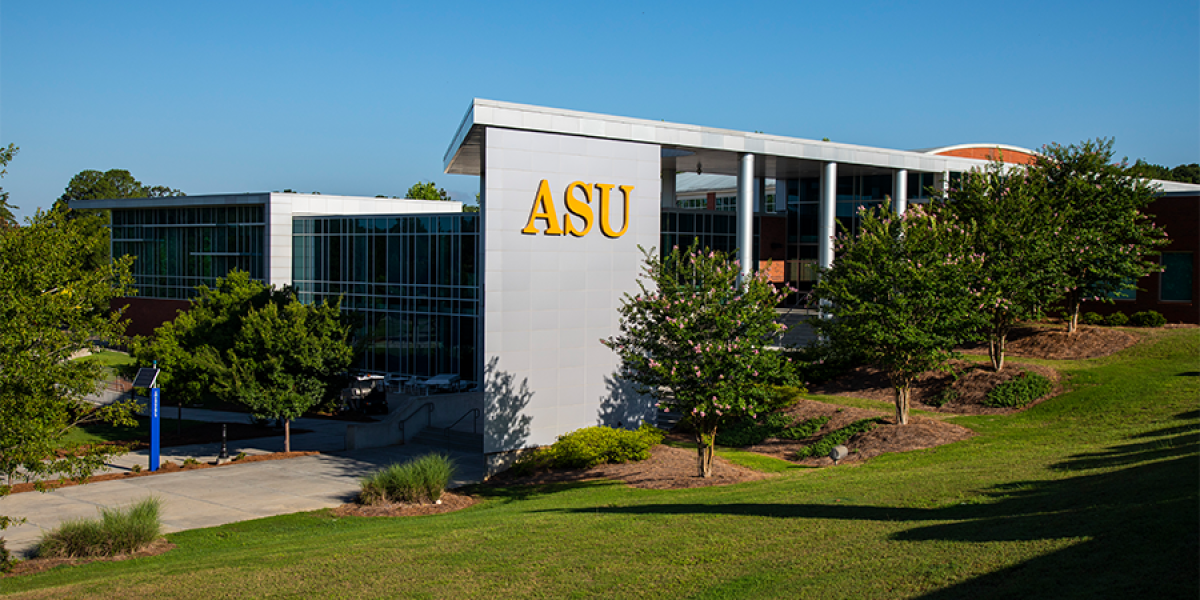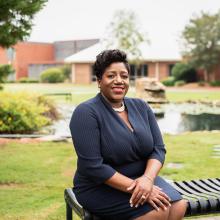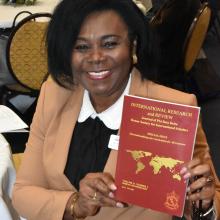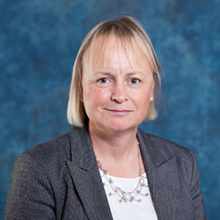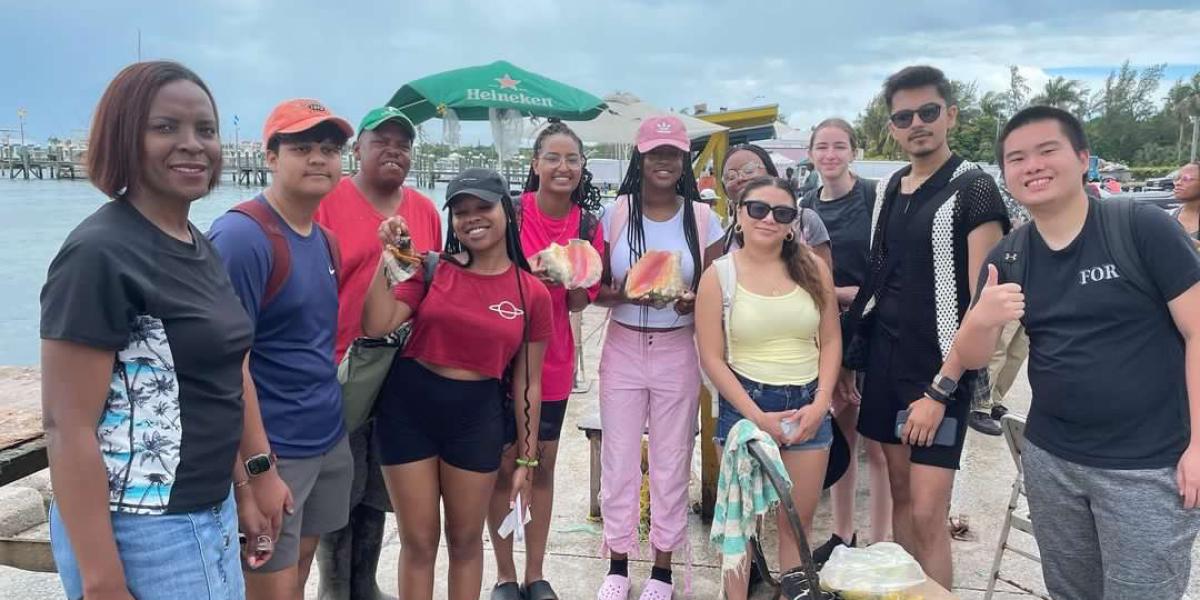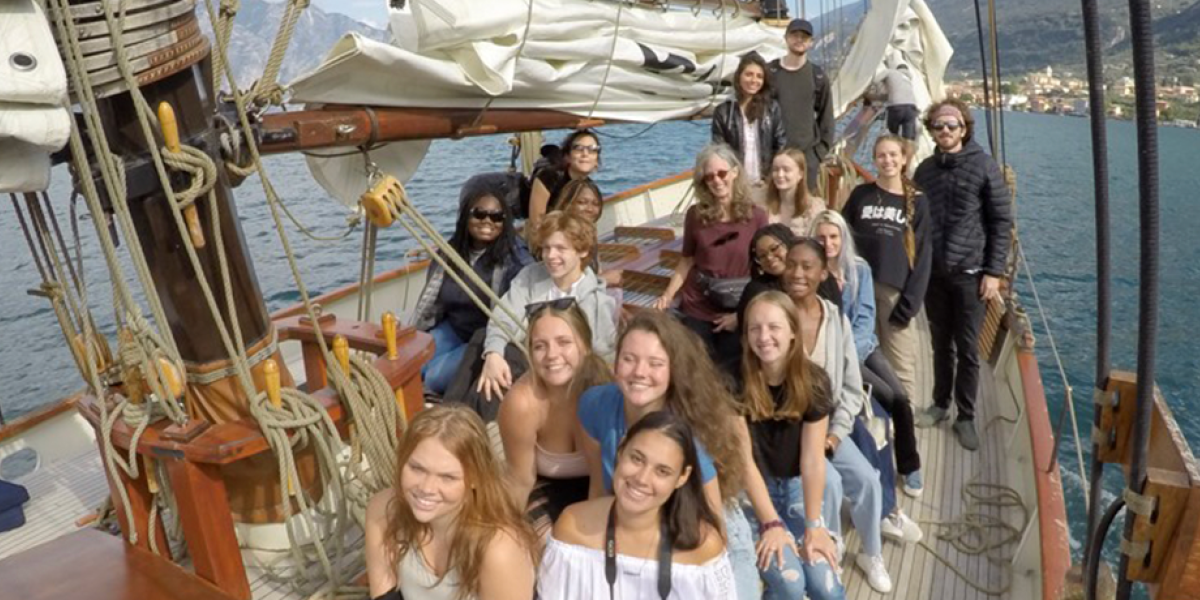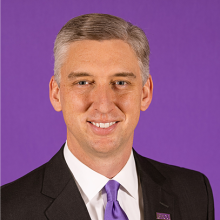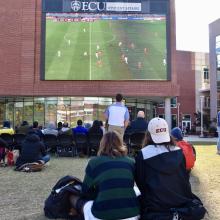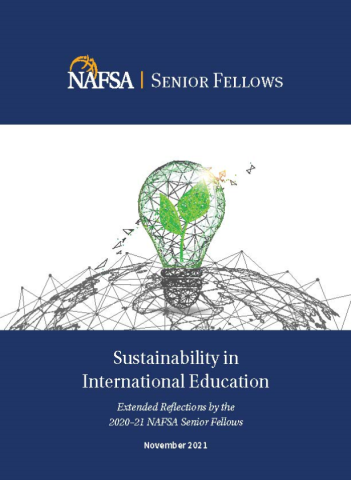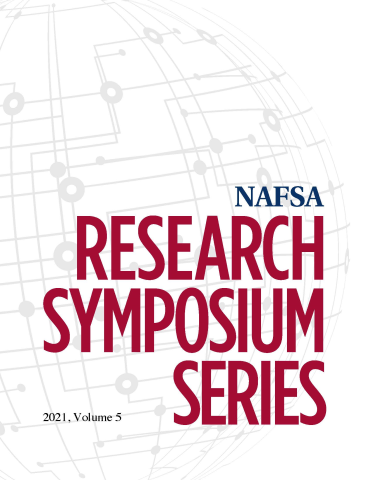2023 Spotlight Albany State University
Albany State University is a public institution and HBCU in Albany, Georgia, with more than 6,000 students. Because few of its students study abroad, the university has successfully launched a professional development program that trains faculty across multiple colleges and disciplines to internationalize their courses. As a result, thousands of students have had access to global learning opportunities
When Christian Andrade Herrera traveled back to his native Mexico during the winter break of his first year at Albany State University to visit his family, he decided to take a six-hour trip to the village of Real de Catorce in the Sierra Madre mountain range. It’s a pilgrimage site for the indigenous Huichol people.
Even though he grew up in the same region as the Huichol, Herrera had never heard of the group before he took an introduction to anthropology class at Albany State. That class inspired him to travel to meet the people he studied about. “It was a great experience to see the things I learned in the classroom outside in the real world,” says Herrera, a biochemistry major who graduated in spring 2023. “I was able to immerse myself in the rich culture of the city and meet some of the Huicholes who owned a folk-art store in the city.”
That anthropology class was just one of around 100 classes at Albany State that have been infused with global content through a curriculum internationalization initiative. When Professor of English Nneka Nora Osakwe started at Albany State in 2004, she joined the ongoing curriculum internationalization initiative, assisting to train other faculty members on how to globalize their courses. Six years later, she became the director of the university’s Office of International Education, a position she held until 2021 before transitioning to her current role as an English professor and the provost’s special assistant for internationalization and global engagement.
A Renewed Focus on Curriculum Internationalization
Over the years, support for curriculum internationalization waned under different university administrations, Osakwe said. When it became clear that it was difficult to recruit students to study abroad, Osakwe sought the support of a new president and renewed the focus on curriculum internationalization as a way to promote global learning in 2016. This trend accelerated in 2018, when President Marion Ross Fedrick enrolled Albany State in the American Council on Education’s (ACE) Internationalization Laboratory, which expanded global learning awareness on campus. Since then, external grants from organizations such as the U.S. Department of Education have helped institutionalize Albany State’s curriculum internationalization framework.
At the beginning of every semester, during the faculty-staff conference, the Center for Faculty Excellence schedules professional development sessions, which include curriculum internationalization. The Office of International Education partners with a select team of faculty internationalization mentors to train a new cohort of faculty to internationalize their courses and earn the designation of curriculum internationalization fellows. These faculty development projects and workshops also continue each summer. The Office of International Education has also collaborated with the Distance and Online Learning Department to develop an internationalization training portal in the University System of Georgia’s GeorgiaView learning management system for faculty who want to complete the training online. Faculty members are incentivized to participate through additional pay, publication opportunities, and favorable consideration during the tenure and promotion process.
Additionally, the Office of International Education organizes regular faculty forums where fellows share creative teaching and evidence-based approaches used in their internationalized courses at home and abroad. The forums serve as venues to train the cohort as they work toward becoming curriculum internationalization fellows. The faculty members become fellows after they submit proposals, go through the internationalization professional development, revise their syllabi to include six critical global learning elements, implement their revised course, and share their implementation outcomes in any of the forums.
One of the key components of Albany State’s approach to curriculum internationalization is through experienced faculty sharing best practices as curriculum internationalization fellows. Over the past two decades, more than 100 faculty members have earned this designation, leading to the internationalization of more than 100 courses. In addition, 24 of the fellows have published articles and book chapters that are used as models for training new and existing faculty members who also infuse global learning into their courses.
Thousands of students like Herrera have taken Albany State's internationalized courses. The College of Arts and Sciences and the College of Business, Education, and Professional Studies both require all their students to take at least one internationalized social science or humanities course, and the Darton College of Health Professions also requires first-year bachelor's degree students to take a cultural diversity course that has been internationalized. Having these policies in place signals buy-in at an institutional level, which sets the tone for faculty.
Internationalizing the Health Sciences
Albany State’s professional development opportunities make it much easier for faculty to take on the challenge of internationalization, says Andrea Dozier, the interim chair of Albany State’s Department of Nursing and a curriculum internationalization fellow.
It wasn’t until Dozier accompanied nursing students on a study abroad trip to Jamaica in 2019 that she began to understand the importance of curriculum internationalization. “I hadn’t ever been outside of the United States,” says Dozier. “I had to internationalize myself before I could internationalize the course.”
Dozier realized how important having a global perspective was for anyone working in the health care field. She chose to internationalize Conceptual Basis for Professional Nursing, a class taken by students who have received their nursing license and are already working in the field.
She was teaching online and wanted to create opportunities for those studying remotely to participate in internationalization. The assignments of the internationalized version of the course ask students to reflect on situations where nurses might not speak the same language as their patients and think about stereotypes they might hold about certain groups of people.
Now, nursing is becoming a model for the other health sciences. Sarah Brinson, dean of the Darton College, says that it’s her goal for all 13 of the health science programs to have at least one internationalized course. The introductory course taken by all physical therapy students, for example, now includes content related to how patients might need to be treated differently depending on their cultural background.
Faculty Buy-in and Global Learning for All
Some faculty were initially skeptical about internationalization, either because it would be too much work or because they didn’t understand why it was important. “I think that from a faculty standpoint, we get bogged down into the weeds and have so many other duties that the thought of doing something different is just overwhelming,” says Dozier.
Patrick Whitehead, associate professor of psychology, joined a faculty learning community sponsored by Osakwe because he was interested in taking students abroad. He was surprised when he suddenly had several new ideas for his classes. He spent three semesters refining an internationalized course on human development, which covers topics such as the transition from childhood to adulthood. He added international content, such as looking at childbirth and child-rearing in indigenous Canadian cultures.
When he first launched his new course, he tried to incorporate global material on top of the content he was already teaching. “I had 100 things that I wanted to cover,” he says. “And about halfway through that semester, I was like, ‘I don't think they're getting it.’”
He quickly cut down on the number of activities he was trying to do and found the students responded much better. “I understood that less can be more beneficial,” Whitehead says.
Whitehead says that curriculum internationalization is particularly important for a university like Albany State, where around two-thirds of the students are eligible for Pell Grants and may not be able to pursue study abroad opportunities.
“It’s really accessible, and that, in my opinion, makes internationalization probably more powerful at our school than studying abroad,” he says. “Even though study abroad is life changing, it still has limits in terms of who can do it just by the price tag. I see curriculum internationalization as even more valuable for our school as a whole.”

